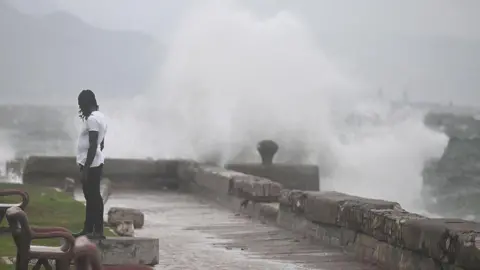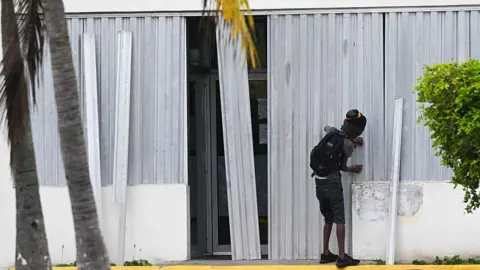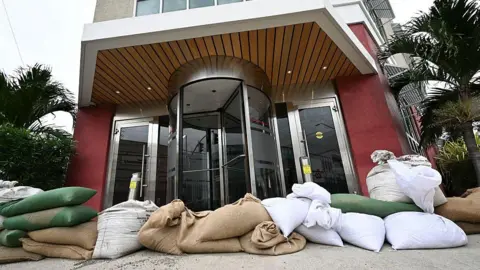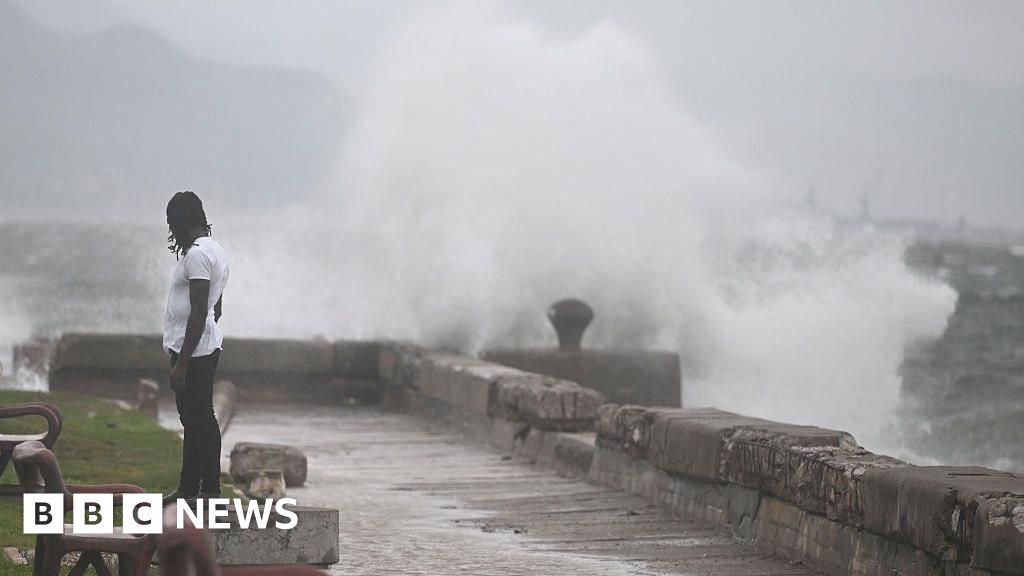Jessica Rawnsley and
Gabriela Pomeroy
 Getty Images
Getty ImagesResidents and holidaymakers in Jamaica have been describing their terror as Hurricane Melissa has made landfall in south-western Jamaica, the strongest storm to hit the Caribbean nation in modern history.
Locals and tourists described hunkering down as the category four storm ripped roofs off houses and cut power to about a third of the country’s 2.8 million population.
“The doors are being blown off by the wind,” said Kabien, a mother-of-three who runs a beauty salon in the town of Santa Cruz.
With panic in her voice, she said: “I am trying to use my own manpower to stop the wind blowing in the door.”
“There is water coming through the roof of the house,” she said. “I am not OK.”
Her three young children were “very, very scared”, she added.
Melissa made landfall in south-western Jamaica near the town of New Hope with wind speeds of 185 mph (295 km/h), according to the US National Hurricane Center (NHC).
Originally a category five storm, it was downgraded to category four after it made landfall and began moving diagonally across the island. Up to 30in (76cm) of rain is expected in some parts of Jamaica.
Officials say it will continue to decrease in intensity, but remain extremely dangerous, as it moves towards Cuba and then the Bahamas.
Kyle Holmes, from Bolton, who is visiting Jamaica with his wife and young daughters, aged 7, 10, and 12, for a family wedding, told the BBC of the devastation wreaked by the storm.
He said the hotel he was staying in – the Grand Palladium Resort, in the town of Lucea, half an hour from Montego Bay on the coast – looks like “a disaster zone”.
He said he barricaded the windows to the hotel room by placing all the furniture against them, and his family were safe after the “worst experience ever”.
Winston Warren, who has been riding out the hurricane from inside his home in east Kingston, less than a kilometre from the ocean, told the BBC: “There are times you just wonder – are the waves going to come crashing into your house.
“We’ve seen a lot of roofs blown off.”
Emma, who is on a family holiday in Jamaica from Essex, England, said the windows of their Montego Bay hotel had been smashed by high winds.
“We moved to a safe room as the children were petrified,” she said. “The windows have been blown through and the staff are working furiously to make us safe.
“We have all just moved to another room in the building as the glass in the lobby is unsafe. We are all terrified.”
Damion, a computer scientist living in Kingston, told the BBC he had woken on Tuesday to winds “so strong you would not be able to stand up” outside.
At his mother’s home, an hour away in Manchester Parish, “the winds have been so strong part of the roof has lifted off”, he said.
Simon Johnson, 33, who lives in Harbour View in Kingston with his wife and two sisters, said the family had experienced hurricanes before – “but not one of this size”.
Living just 200m (650ft) from the harbour, he told the BBC he was “feeling anxious”.
They have stockpiled a week’s worth of food, he added, but many of the supermarkets were empty and he could not find any bread in the neighbourhood.
‘Catastrophic and life-threatening’
Officials warned people as the storm arrived to cover themselves with a mattress, move to an indoor room, and to wear a helmet if possible.
Jamaican health officials also warned that flooding may displace crocodiles from their natural dwellings.
Melissa is the strongest storm on record for the island nation – and the strongest globally this year.
The NHC warned of “catastrophic and life-threatening” conditions once it landed in Jamaica, with torrential rainfall, deadly flash flooding and landslides.
Three “storm-related deaths” on the Caribbean island have already been attributed to the storm, as well as four deaths in Haiti and the Dominican Republic.
The storm is expected to be particularly devastating along the coast of Kingston, where much of the country’s critical infrastructure is located, including the international airport and power plants.
Mandatory evacuation orders have been issued by the government for at least seven areas in the south-east classified as high risk – with airports and schools across the country shut.
Tourists have described being “stuck in limbo” with the country’s two international airports closed, flights cancelled and limited information from airlines.
Rebecca Chapman, who travelled to Jamaica for her 25th wedding anniversary, said she had arrived on Thursday evening just as storm preparations began.
She is staying in Lucea with her husband and their three teenage sons.
“The birds have all gone so it’s all gone really quiet. It’s like a ghost town,” she told BBC Radio 4’s Today programme before the storm hit on Tuesday.
The Foreign Office has advised Britons in Jamaica to follow local authority advice, “especially in the event of any evacuation orders”.
 Getty Images
Getty Images Getty Images
Getty Images‘The birds have all gone’
Tourists have described being “stuck in limbo” with the country’s two international airports closed, flights cancelled and limited information from airlines.
Rebecca Chapman, who travelled to Jamaica for her 25th wedding anniversary, said she had arrived on Thursday evening just as storm preparations began.
She is staying in Lucea, half an hour from Montego Bay on the coast, along with her husband and their three teenage sons.
“There’s this weird roar that sounds like it’s coming from the sea,” she told BBC Radio 4’s Today programme before the storm hit on Tuesday. “It’s really odd, like something’s coming. The birds have all gone so it’s all gone really quiet. It’s like a ghost town.”
“The trees are snapping, the wind is slamming into our rooms and the rain is relentless,” Keira Witcomb said.
Ms Witcomb, who travelled to Jamaica from the UK for her mother’s wedding, said they were “absolutely terrified” and “scared for our lives”.
Alex Baskeyfield, from West Yorkshire, is currently staying in the town of Negril on the west coast of the island with his wife and their 13-year-old daughter. He tried to leave Jamaica in the days before the storm hit but all departing flights were fully booked.
He described the atmosphere as “strange and unusual” with “extreme preparations” under way at his hotel – including windows shuttered with wood, everything being tied down, and ceiling fans and televisions removed.
“There’s been an army of people for the last 48 hours unscrewing anything they could,” he added.
“You do get a real sense that something incredibly serious is about to happen.”
The Foreign Office has advised Britons in Jamaica to follow local authority advice, “especially in the event of any evacuation orders”.



